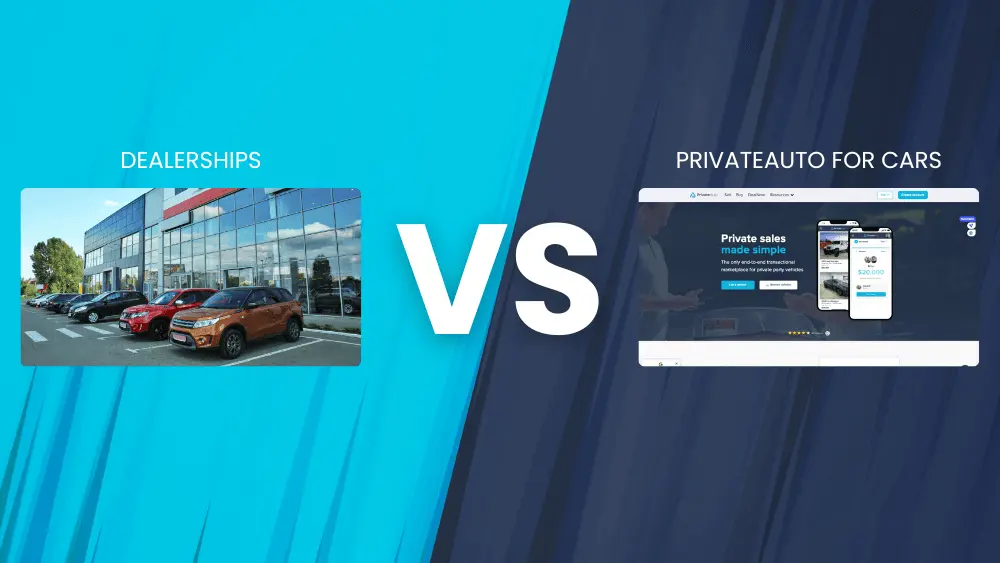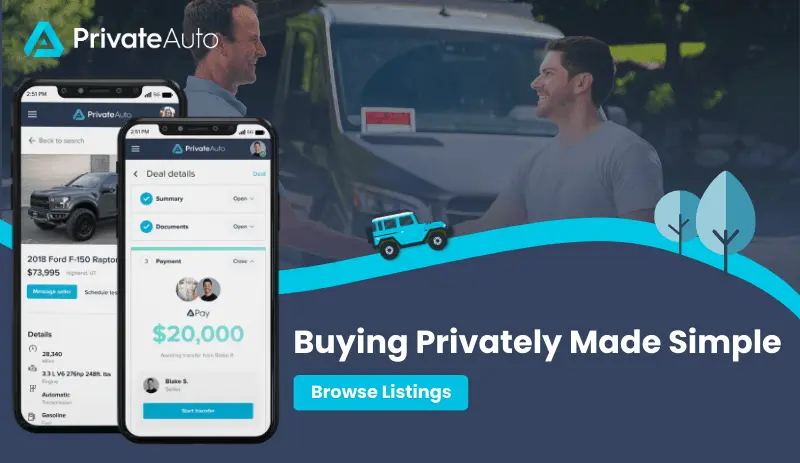Avoid dealer fees
Avoid Fees

Get a better price
Get a Better Price
Buy from the original owner to cut out the middleman and get more vehicle for your money. Check out our guide to buying a private-party vehicle for step-by-step instructions.
Find more cars
Better Vehicle Selection
PrivateAuto has more private-party cars for sale than any other website. And, we give you the transactional infrastructure to get the deal done—safely, securely, and conveniently. Now, our instant payment solution, combined with our integrated car transport, makes it easy to buy a car long-distance and have it shipped to your door.
When you tap into the private seller market, you’re much more likely to find hidden gems, such as:
- Specialty vehicles
- Customized and modified vehicles
- Vintage or classic vehicles
- Specific color or trim packages
- Unique feature combinations
Control the deal
Drive The Deal on Your Terms
PrivateAuto lets you offer less than the purchase price with our innovative “make an offer” feature. With a couple of clicks in the PrivateAuto app, you’ve sent an offer. No awkward back-and-forth conversations trying to talk the seller down.
The seller can accept your offer, reject it, or counteroffer with the click of a button.
It’s price negotiation, built into our transactional workflow.
Lemon laws
Buyer Protections
This is one area where a dealership purchase has an edge over a private-party car. Even so, we think the benefits of a private purchase outweigh the risks—so long as you do your research, buy only from verified sellers, examine the vehicle history report, and get a professional pre-purchase inspection (easy to do from your PrivateAuto dashboard with our LemonSquad integration.
Paperwork
Paperwork
While individual states may vary, you’ll most likely need to handle the following items with your local DMV (or equivalent agency for your state):
1. Title transfer. The seller will sign over the vehicle title to you at the closing, then you’ll complete a title transfer with the DMV. In most states, there’s a fee associated with transferring the title.
2. Sales taxes. unless you live in a tax-free state, you’ll pay sales tax when you register the car. In addition to your state’s sales tax, you may owe a tax to your city, your county, or both.
3. Registration. You’ll register the car in your name and pay a registration fee.
4. License plates. Unless you live in California or Minnesota, you’ll get new license plates and pay the associated fee.
Always consult with your DMV for the most up-to-date processes and procedures for your state and county.
Easy Private-Party Transactions
Here are some of the benefits:
- Instant, fee-free, and secure payments via PrivateAuto Pay. Send unlimited amounts in the blink of an eye. You’ll never want to pay for a car any other way.
- In-app messaging keeps your contact info private.
- Test drive scheduling feature eliminates back-and-forth with the seller.
- In-app electronic signing of the bill of sale protects you and gives you a legal record.
- Integrated services—financing, transport, insurance, warranty, inspection, etc.—give you a one-stop-shop to handle everything involved with becoming a car owner.
Found your dream car on Facebook Marketplace, Craigslist, or eBay Motors? DealNow lets you start a deal on another site and close the sale anytime. Invite the seller to DealNow via a custom link you’ll create, and then enjoy our fast-track deal flow and proprietary infrastructure.
DealNow helps you avoid fraud, sign documents, and instantly transact online.
Car Buying FAQ
What month is it best to buy a car?
When you find the right car for sale by owner at the rig
How many miles can a car last?
With diligent care like regular oil changes, fluid flushes, filter replacements and mechanical repairs as needed, hitting 300,000 or even 400,000 miles is possible for most cars.
Do I need to check the vehicle identification number when buying a used car?
When buying a used car, always check the VIN that the previous owner has written on the title. Carefully compare it to the actual VIN on the car. You want to avoid the problem of having the wrong vehicle information number on the title when you go to register your newly bought car with the DMV.
The PrivateAuto app has a vehicle identification number field where buyers and sellers individually confirm the vehicle identification number. This helps eliminate errors (or the rare case of outright fraud).
How do I avoid fraud when buying a car privately?
To avoid fraud in a private-party car purchase, use PrivateAuto to close the deal, and stay vigilant to any seller behavior that seems odd.
Criminals use a plethora of methods to trick car buyers, such as fake vehicle histories, odometer tampering, or title scams.
PrivateAuto includes vehicle history reports so you know what you’re getting. We have identity verification for sellers, so you know who you’re dealing with, and we keep your personal info protected. We give you a secure payment solution that does not reveal your banking information, and we implement enterprise-grade encryption to keep your data safe.Registration renewal fees are based on the age of the passenger vehicle registered:
1st – 4th year = $96.00
5th – 8th year = $86.00
9th -12th year = $66.00
13th – 16th year = $46.00
17th year + = $26.00
What if I can’t afford to pay cash when buying privately?
If you don’t have the funds to buy a car outright, apply for car financing from our integrated FDIC-insured lending partner. Say goodbye to the endless hassle of coordinating with a third-party bank or credit union. Everything happens in your PrivateAuto dashboard, from initial loan application to buying the car.
If accepted, the lender will fund your PrivateAuto Pay account and you’ll be set to buy that car when the weekend rolls around.
It’s the most convenient way to get a vehicle loan. Want to know how much your payments will be? Our handy auto loan calculator will tell you.
What paperwork is needed to buy a car from a private seller?
Each state defines its own requirements for paperwork and processes. If you are unsure of which documents you need, contact your local Department of Motor Vehicles office for more info.
Here are some common items that are needed to finalize your private-party purchase:
– Bill of sale
– Vehicle title
– Proof of auto insurance
– State ID
– Odometer statement
– Inspection forms
Popular Vehicles For Sale By Owner

Andy Lewis
Contributing Author
Andy Lewis is the Chief Technology Officer (CTO) at PrivateAuto, bringing over 30 years of expertise in the technology field to the forefront of the online marketplace….

